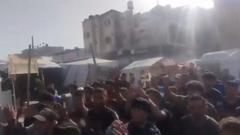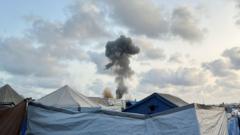As anti-war demonstrations gain momentum in Israel, former military officials and civil activists voice concern over the ongoing Gaza conflict, signaling a substantial change in public opinion amid a humanitarian crisis.
Rising Dissent: Israeli Public Turns Against Gaza Offensive

Rising Dissent: Israeli Public Turns Against Gaza Offensive
With the war in Gaza escalating, a significant shift in Israeli public sentiment emerges, highlighting growing discontent towards military actions and calls for peace.
As the conflict in Gaza intensifies, a wave of dissent is emerging among Israelis against the government's handling of the war. Prominent figures, including Yair Golan, a left-wing politician and ex-IDF deputy commander, have publicly condemned the military actions, warning that Israel risks becoming a "pariah state" akin to apartheid-era South Africa. Golan's remarks ignited backlash from Prime Minister Benjamin Netanyahu, who labeled them as "blood libel."
The situation escalated further when Moshe "Bogi" Ya'alon, a former defense minister and IDF chief of staff, criticized the government's objectives, stating the current policy equates to a quest for power that could lead the nation to ruin. Only a year and a half ago, following a devastating Hamas attack that left approximately 1,200 Israelis dead, such criticisms would have been unthinkable.
In the face of deepening destruction in Gaza and the devastation of the local health system, a recent survey showed that 61% of Israelis want the war to end and urge for the safe return of hostages, aligning with sentiments expressed by former hostage negotiator Gershon Baskin. He relayed that most hostage families seek peace through negotiation rather than an escalation of violence against Hamas.
Despite ongoing military operations, anti-war groups continue to rally for a ceasefire, with David Lammy, the UK Foreign Secretary, condemning Israel's actions as "morally unjustifiable." Notably, a protest led by the Standing Together group, showcasing images of Palestinian children affected by the war, indicates a growing awakening within the Israeli populace.
However, divining consensus proves challenging, as some Israelis cling to the belief that the civilians in Gaza share culpability through their association with Hamas. This complex dynamic has drawn international scrutiny, leading the UK, France, and Canada to issue stern warnings and explore further sanctions against Israel if the humanitarian crisis in Gaza does not significantly improve.
As public opinion evolves and more Israelis question the ongoing military strategy, this critical moment in the conflict hints at possible changes in approach, both domestically and internationally. "The mood is changing," remarked activist Uri Weltmann, echoing the sentiment that many now recognize the need for a new direction in how Israel engages with Gaza.




















